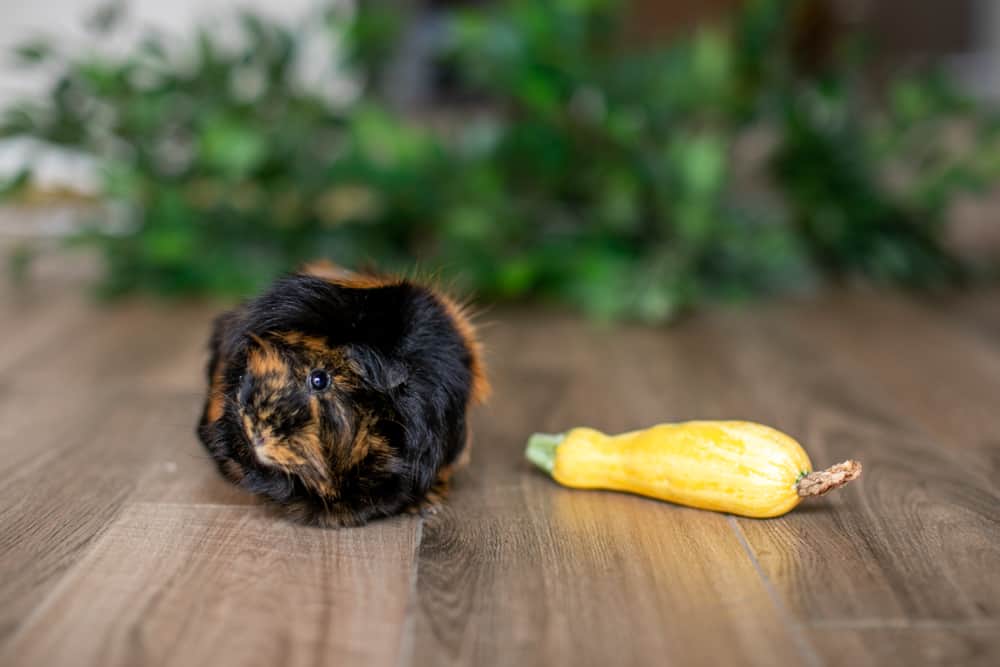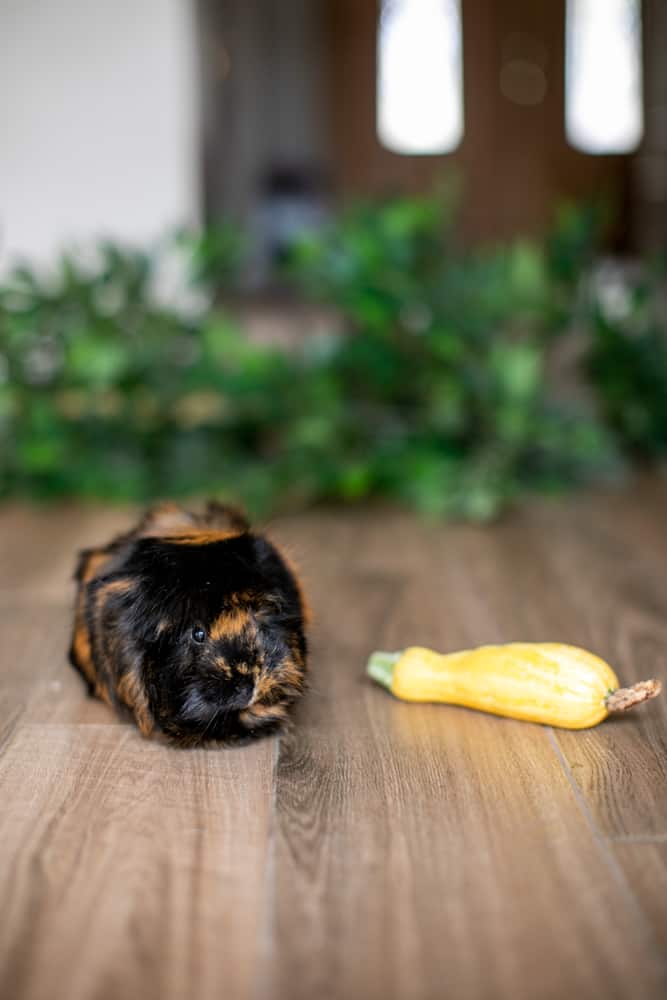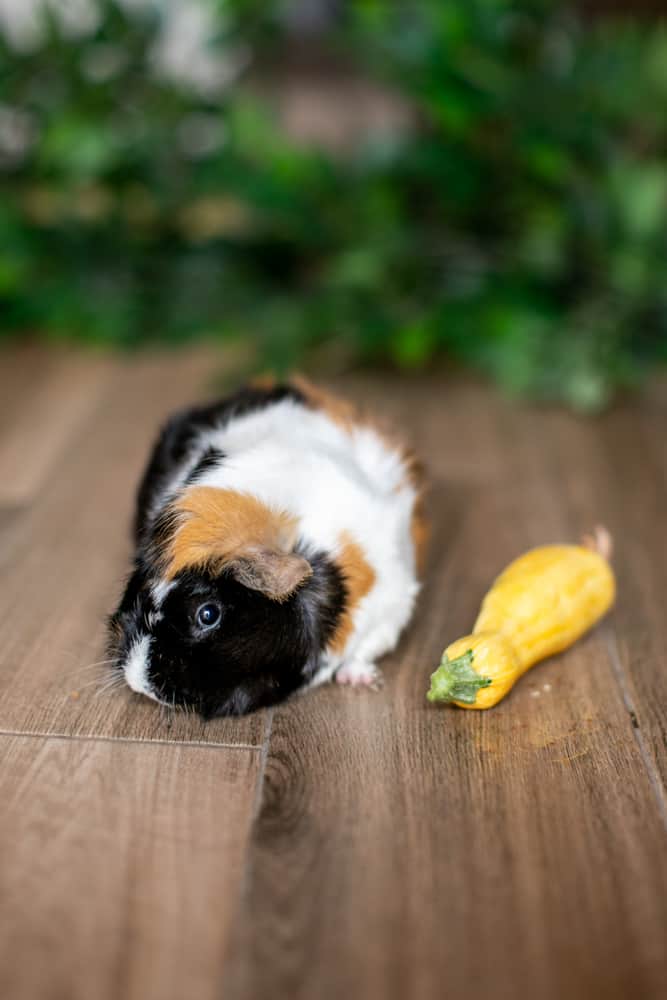As an Amazon Associate we earn from qualifying purchases.
Guinea pigs are popular pets in many households. They are relatively low maintenance, and their cute little faces make them hard to resist. Many people don’t realize that guinea pigs can be picky eaters, however. Summer squash may be an option, but can guinea pigs eat summer squash?
Feeding Guinea Pigs Summer Squash
Can Guinea Pigs Eat Summer Squash?
Guinea pigs are small, herbivorous animals that originate from the Andes Mountains in South America. These popular pets have become increasingly popular in recent years due to their gentle and affectionate nature.

While guinea pigs are typically known for eating hay, guinea pig pellets, and vegetables, some owners may wonder if it’s okay to feed their pet summer squash.
So, can guinea pigs eat summer squash? The answer is yes! Summer squash is a great source of vitamins and minerals for your guinea pig. This type of squash is also low in sugar and calories, making it a healthy treat for your pet.
When feeding summer squash to your guinea pig, be sure to wash it thoroughly and remove any seeds or stems.
Benefits of Summer Squash
Guinea pigs are unique among other pets in that they require a diet rich in Vitamin C. Since guinea pigs cannot synthesize their own Vitamin C, it is important to provide them with foods that are high in this nutrient.
Summer squash is an excellent source of Vitamin C and other nutrients that are important for the health of guinea pigs.
Some of the benefits of summer squash for guinea pigs include:
- Boosts immunity. The high levels of Vitamin C in summer squash can help to boost the immune system of guinea pigs, making them less susceptible to diseases and infections.
- Prevents scurvy. Scurvy is a disease caused by a deficiency of Vitamin C and can lead to the development of bleeding gums, bruising, and other health problems. By providing guinea pigs with yellow squash, you can help to prevent this disease.
- Aids to painful digestion. The high levels of fiber in summer squash can help to promote healthy digestion in guinea pigs.
- Helps to keep fur healthy. The nutrients in summer squash can also help to keep the fur of guinea pigs healthy and lustrous.
In addition to the above benefits, summer squash is also a low-calorie food that is rich in water content. This makes it an ideal food for guinea pigs who are overweight or prone to obesity.
How Much Is Too Much?
Guinea pigs are small animals and should not be overfed. If you think your guinea pig has been overfed, there are a few things to look for.
- The first is an increase in their water intake. If they are drinking more water than usual, it could be a sign that they are overeating.
- Another sign is if they start to put on weight. This can be especially noticeable if they were previously a healthy weight.
- If your guinea pig is overeating, cut back on the amount of food you are giving them. You should also offer them fewer treats. If you have any concerns, please consult with a veterinarian.
Other Types Of Squash
Squashes That Are Safe for Guinea Pigs to Eat
There is a variety of squash that you can feed to your guinea pig, each with its nutritional benefits. Some of the most popular types of squash include:

Butternut Squash
This type of squash is an excellent source of vitamin A, which is important for guinea pigs for proper eye and skin health. It also contains fiber, which can help with digestive health.
Pumpkin
Pumpkin is another type of squash that is high in vitamin A, as well as potassium and fiber. Feeding pumpkins to your guinea pig can help them maintain a healthy digestive system.
Acorn Squash
Acorn squash is a good source of vitamins C and B6, both of which are essential for guinea pigs. It also contains magnesium, which can help to keep bones healthy.
Guinea pigs are unique among other pets in that they require a diet rich in Vitamin C. Since guinea pigs cannot synthesize their own Vitamin C, it is important to provide them with foods that are high in this nutrient.
Summer squash is an excellent source of Vitamin C and other nutrients that are important for the health of guinea pigs.
What Guinea Pigs Usually Eat?

Guinea pigs are cute and cuddly, and they make great pets. But what do guinea pigs usually eat?
Well, guinea pigs are herbivores, which means that their diet consists mostly of plants. hay. In the wild, guinea pigs would graze on grasses and other vegetation. But in captivity, hay is the mainstay of their diet.
In addition to hay, guinea pigs also enjoy eating fresh vegetables and fruits. Some of their favorites include carrots, celery, broccoli, apples, and grapes. When feeding your guinea pig fresh produce, be sure to wash it thoroughly and remove any squash seeds or pits first.
As with any pet, it’s important to feed your guinea pig a healthy and balanced diet. If you have any questions about what to feed your guinea pig, be sure to consult with a veterinarian or other pet care expert.
Taking Care Of Guinea Pigs
Guinea pigs are one of the most popular pets in the world, and it’s not hard to see why. They’re adorable, intelligent, and social creatures that make great companions. But like any pet, guinea pigs require care and attention to stay healthy and happy.
Here are a few tips on how to take care of your guinea pig:
- Provide fresh water at all times. Guinea pigs need access to clean, fresh water at all times. A water bottle with a small drinking tube attached is the best way to give them water, as they can’t drink from a bowl like other animals.
- Feed them a variety of fresh vegetables. Guinea pigs are herbivores, so their diet should consist mostly of fresh vegetables. Offer them a variety of different vegetables to choose from, and cut them into small pieces so they can easily eat them.
- Give them hay to chew on. Hay is an important part of a guinea pig’s diet, as it helps wear down their growing teeth. It also provides them with essential nutrients that they need.
- Provide a comfortable home. Guinea pigs need a spacious cage that gives them plenty of room to move around and explore. Their cage should also be outfitted with hiding places, like tunnels or huts, where they can go to feel safe and secure.
- Handle them gently. Guinea pigs are delicate creatures, so it’s important to handle them gently. Pick them up carefully, using both hands to support their body, and avoid holding them upside down.
By following these simple tips, you can make sure your guinea pig stays healthy and happy for years to come.